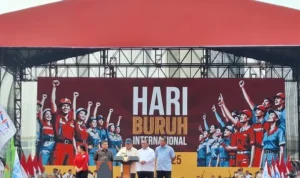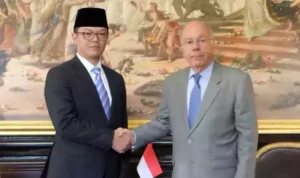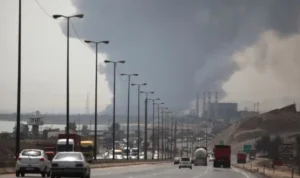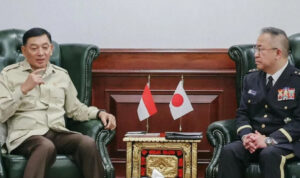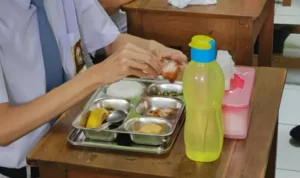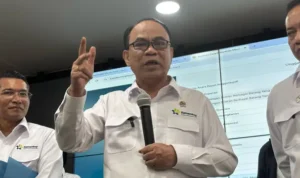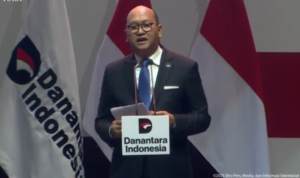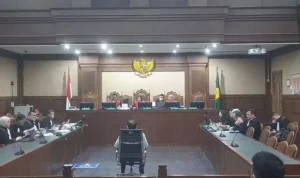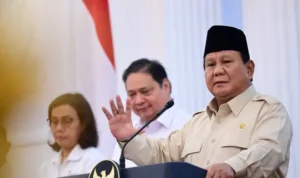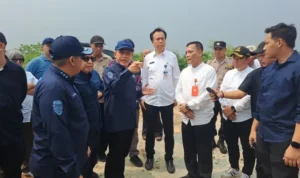INDONESIAUPDATES.COM, News En – The Indonesian government has successfully intercepted the circulation of illegal textile products suspected to have originated from China. This operation was a collaborative effort involving the Ministry of Trade, the Indonesian Maritime Security Agency (Bakamla), and the Indonesian National Military Strategic Intelligence Agency (BAIS).
Minister of Trade Budi Santoso revealed that the intercepted textile goods included used clothing, new clothing, and fabric rolls. The illegal goods were believed to have entered through the Kalimantan border.
A Major Seizure of Illegal Goods
A total of 1,663 koli (bundles) of goods were seized, with an estimated value of approximately IDR 8.3 billion. Budi stated, “The total value of the seized goods is approximately IDR 8.3 billion, consisting of imported balpres containing used clothing, new clothing, and fabric rolls, all suspected to be illegal.”
The successful interception of the illegal textiles took place in two locations: Surabaya (East Java) and Subang (West Java). Budi emphasized that this operation was a direct violation of several Indonesian trade regulations, including the Ministry of Trade Regulation Number 40 of 2022 and Ministry of Trade Regulation Number 8 of 2024.
Threat to Domestic Industry and the Local Market
Budi stressed that the smuggling of these illegal textile goods could have severe consequences for Indonesia’s domestic textile industry. The influx of cheap, illegal products threatens local markets and could result in the closure of garment factories, layoffs, higher unemployment rates, and challenges for small businesses (UMKM) to compete. Additionally, the practice could lead to significant losses in government revenue.
Strict Sanctions Await Importers of Illegal Goods
The government has announced that the importers behind these illegal textile goods will face administrative sanctions, ranging from written warnings to the temporary suspension or even revocation of business licenses. Budi concluded, “The perpetrators will face severe consequences, including written warnings, business activity suspensions, or the revocation of their business licenses.”
With this firm stance, the government aims to eradicate illegal imports, protect the domestic textile industry, and ensure the integrity of the local market.
FAQ: Crackdown on Illegal Textile Imports in Indonesia
1. What types of illegal textile products were intercepted? The intercepted illegal textile products included used clothing, new clothing, and fabric rolls. These goods were believed to have been smuggled into Indonesia from China via the Kalimantan border.
2. How much was the value of the seized illegal textiles? A total of 1,663 koli (bundles) of illegal textile goods were seized, with an estimated value of IDR 8.3 billion.
3. Where were the illegal textile products intercepted? The illegal products were intercepted in two locations: Surabaya (East Java) and Subang (West Java).
4. What regulations were violated by the smuggling of these textiles? The smuggling violated the Ministry of Trade Regulation No. 40 of 2022 (amendment to Regulation No. 18 of 2021 on Prohibited Export and Import Goods) and the Ministry of Trade Regulation No. 8 of 2024 (amendment to Regulation No. 36 of 2023 on Import Policies and Regulations).
5. What is the potential impact of illegal textile imports on Indonesia’s domestic industry? The smuggling of illegal textiles poses a serious threat to Indonesia’s domestic textile industry by flooding the market with cheap, unregulated products. This could lead to the closure of garment factories, layoffs, an increase in unemployment, and difficulties for small businesses (UMKM) to compete.
6. What sanctions will be imposed on the importers of these illegal goods? Importers of illegal textiles will face administrative sanctions, including written warnings, temporary suspension of business activities, and the revocation of their business licenses.
7. Why is the government so focused on cracking down on illegal textiles? The government’s crackdown aims to protect the local textile industry, prevent significant economic losses, and maintain a fair market environment. The smuggling of illegal goods can harm the national economy, hurt local businesses, and result in lost government revenue.
8. How does the government plan to prevent illegal textile imports in the future? The government is committed to eradicating illegal imports through stricter enforcement of trade regulations, surveillance at borders, and collaboration between relevant agencies, such as the Ministry of Trade, Bakamla, and BAIS.
9. How can consumers help in combating the illegal textile trade? Consumers are encouraged to be mindful of the origin of the textiles they purchase and avoid buying products from unknown or suspicious sources. Supporting local businesses and the legal textile industry helps to reduce the demand for illegal imports.
10. What should businesses do to ensure they are complying with import regulations? Businesses should ensure they follow all applicable regulations for importing goods into Indonesia, including verifying the legality of products and ensuring proper documentation for imports. Non-compliance can result in severe sanctions, including the suspension or revocation of business licenses.
FOLLOW INDONESIAUPDATES.COM ON GOOGLE NEWS


